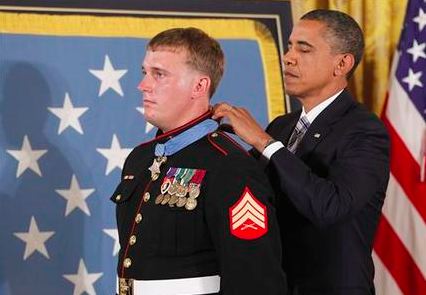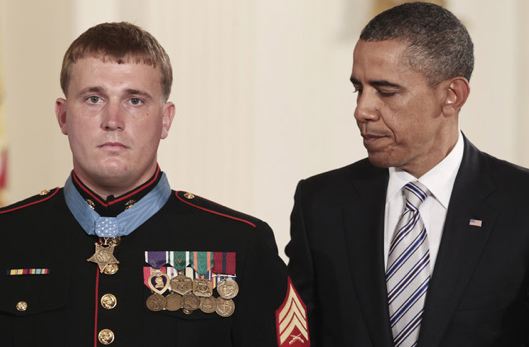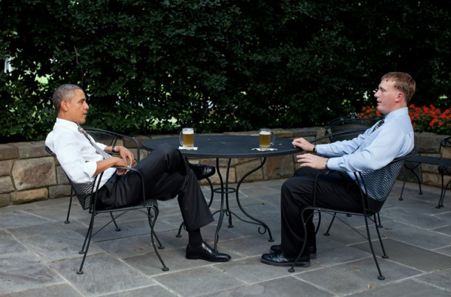HooRah!
The Blaze:
Marine Cpl. Receives Medal of Honor for Saving 36 Lives in Afghanistan
Posted on September 15, 2011 at 6:57pm by Madeleine Morgenstern

President Barack Obama awards the Medal of Honor to former Marine Cpl. Dakota Meyer, 23, from Greensburg, Ky,. Thursday, Sept. 15, 2011, during a White House ceremony. Meyer was in Afghanistan's Kunar province in Sept. 2009 when he repeatedly ran through enemy fire to recover the bodies of fellow American troops. (AP Photo/Charles Dharapak)
WASHINGTON (The Blaze/AP) — President Barack Obama on Thursday bestowed the nation’s highest military honor on Dakota Meyer, a young and humble Marine who defied orders and barreled straight into a ferocious “killing zone” in Afghanistan to save 36 lives at extraordinary risk to himself.
“You did your duty, above and beyond,” Obama told Meyer after reciting his dramatic story. Though the corporal and a fellow Marine were going against orders – commanders considered their effort too dangerous – they were doing what they thought was right, Obama said.
The president placed the Medal of Honor ribbon around Meyer’s neck, patted his back and shook his hand as the audience in the White House East Room applauded.
At age 21, Meyer charged through heavy insurgent gunfire on five death-defying trips in an armored Humvee to save 13 Marines and Army soldiers and an additional 23 Afghan troops pinned down by withering enemy fire.
Meyer killed at least eight insurgents despite suffering a shrapnel wound in his arm as he manned the gun turret of the Humvee and provided covering fire for the soldiers, according to the military.
He had been supporting a patrol on Sept. 8, 2009, into a village in the Ganjgal Valley on the day of the ambush.
Meyer and the other Americans had gone to the area to train Afghan military members when, suddenly, the village lights went out and gunfire erupted. About 50 Taliban insurgents on mountainsides and in the village ambushed the patrol.
As the forward team called for air support that wasn’t coming, Meyer, a corporal at the time, begged his command to let him head into the incoming fire to help.

Meyer is the first living Marine to be awarded the Medal of Honor for actions in Iraq or Afghanistan. (AP Photo/Pablo Martinez Monsivais)
Four times he was denied his request before Meyer and another Marine, Staff Sgt. Juan Rodriguez-Chavez, jumped into the Humvee and headed into the fray. For his valor, Rodriguez-Chavez, a 34-year-old who hailed originally from Acuna, Mexico, would be awarded the Navy Cross.
“They told him he couldn’t go in,” said Dwight Meyer, Dakota Meyer’s 81-year-old grandfather, a former Marine who served in the 1950s. “He told them, `The hell I’m not,’ and he went in. It’s a one-in-a-million thing” that he survived.
Meyer and Rodriguez-Chavez began evacuating wounded Marines and American and Afghan soldiers to a safe point. Meyer made five trips into the kill zone, each time searching for the forward patrol with his Marine friends – including 1st Lt. Michael Johnson – whom Meyer had heard yelling on the radio for air support.
With Meyer and Rodriguez-Chavez ready to test fate a fifth time, a UH-60 helicopter arrived at last to provide overhead support. Troops aboard the chopper told Meyer they had spotted what appeared to be four bodies. Meyer knew those were his friends and he had to bring them out.
“Dakota, I know you’ve grappled with the grief of that day, that you said your efforts were somehow a failure because your teammates didn’t come home,” the president said. “But as your commander in chief and on behalf of everyone here today and all Americans, I want you to know it’s quite the opposite.”

President Barack Obama and Medal of Honor recipient Dakota Meyer each shared a beer on the patio outside of the Oval Office, Sept. 14, 2011. (Pete Souza/The White House)
Obama and Meyer chatted informally Wednesday evening, on a patio outside the Oval Office, over a beer.
In the ceremony, Obama praised Meyer’s humility and work ethic, noting that he would not even take a call from the president during his shift at a construction job because he was working. He’s now out of the Marines. So they two arranged to talk over his lunch hour. Obama jokingly kidded him with thanks for taking the call.
The deaths of Meyer’s comrades prompted an investigation into events that day, and two Army officers were later reprimanded for being “inadequate and ineffective” and for “contributing directly to the loss of life.” Along with Meyer’s friends, a fifth American – Army Sgt. Kenneth W. Westbrook, 41, of Shiprock, N.M. – was fatally wounded in the ambush.
Meyer had said he would be humbled by the memory of his fallen comrades as he received the award Thursday. There were to be separate memorial events, including one at a Columbus, Ga., cemetery for gunnery sergeant Johnson, a father of three who served nearly 13 years in the Marine Corps.
Will Duke, one of the organizers of the tribute, said the memorials spoke volumes about Meyer.
“I can tell by his actions, not only the actions he took in earning the Medal of Honor in Afghanistan but also the actions he is taking now. Essentially by requesting these memorial services for his fallen comrades, he’s saying this is about them,” Duke said.
- Souvenance
Anouar Brahem : Oud François Couturier : Piano Klaus Gesing : Bass Clarinet Björn Meyer: Bass OSI – Orchestra Della Svizzera Italiana, Pietro Mianiti : Conductor...
-
Mark O'Connor, Yo-Yo Ma, Edgar MeyerAppalachian Journey (live) 3:25 1- 1B" (Edgar Meyer) 7:38 2- "Misty Moonlight Waltz" (Mark O'Connor) 10:23 3- 15:42 5- "Indecision" (Meyer) 20:10 "Slumber my Darling" (Stephen Foster - arr:Meyer) 6- "Limerock"...
- Hamburg Hero Receives Medal Of Honor From President Obama
CMHs are rare enough. To have one awarded to someone from my own county merits attention here. It should never have taken 42 years. More on Etchberger here and here Reading Eagle: Hamburg hero receives Medal of Honor from President Obama WASHINGTON,...
- New Rules Designed To Avoid Civilian Casualties Get 4 Marines Killed
Fuck the civilian casualties. They wouldn't give a fig about ours. This is a war, not a fucking pillow fight. CIVILIAN CASUALTIES ARE WHAT GOT US HERE IN THE FIRST GODDAMNED PLACE! You want to avoid civilian casualties? How about giving up the bad...
- U.s. Military Launches Major Afghan Offensive
Foxnews: U.S. Military Launches Major Afghan Offensive Thursday , July 02, 2009 NAWA, Afghanistan — Thousands of U.S. Marines and hundreds of Afghan troops poured into Taliban-infested villages of southern Afghanistan with armor and helicopters Thursday...
